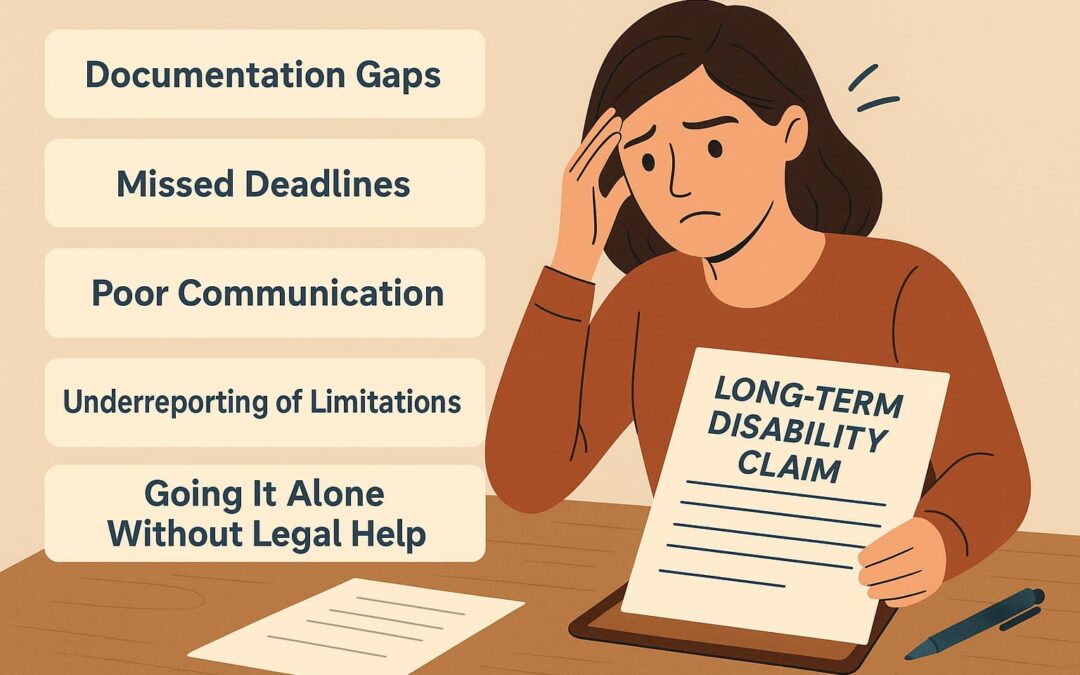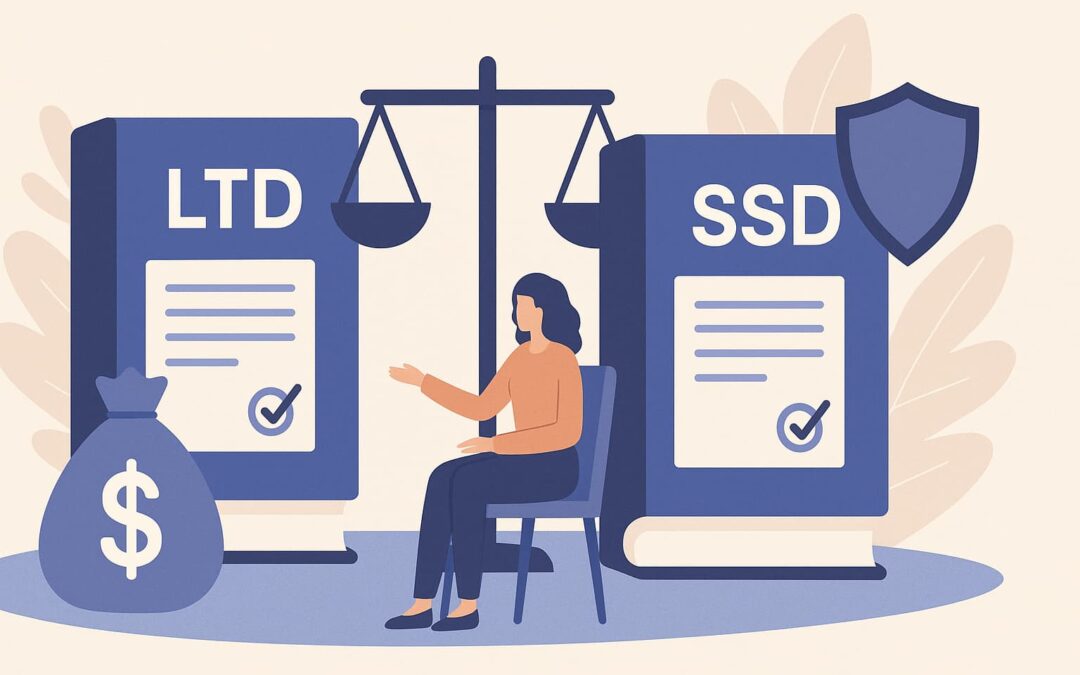Fast forward to today. You’re older now and in need of that care. But when you file a claim, the insurance company that was supposed to be there for you is refusing to pay. They might argue the care isn’t covered, claim a form wasn’t completed correctly, or hide behind the fine print you hadn’t noticed before. Instead of providing support, they’re stalling, denying, and adding stress during one of the most vulnerable times in your life.
Unfortunately, this scenario is all too common. Many LTCI providers prioritize their profits over the promises they’ve made to policyholders, banking on technicalities or tactics to deny claims. But you don’t need to walk this difficult road alone. With the right legal advocate by your side, like Sandstone Law Group, you can fight back against these unjust denials and secure the benefits you deserve and need.
Here’s what we’ll cover in this blog:
- The Key Differences Between Long-Term Care Insurance and Disability Insurance
- Common Reasons for LTCI Claim Denials
- How Sandstone Law Group Fights for Policyholders
- Meet the Sandstone Law Group team
- Insurance Companies’ Financial Reality vs. Consumers’ Plight
- Steps You Can Take Today
Whether you’re facing a denial now or preparing for the future, knowing how to handle long-term disability denials in Arizona can provide the clarity and confidence you need to protect your rights.
LTCI vs. Disability Insurance
Many people mistakenly believe that long-term care insurance and disability insurance serve similar purposes. While both offer financial protection, they are designed for very different situations.
- Long-Term Care Insurance (LTCI) covers the costs of receiving assistance with daily activities, such as bathing, dressing, and eating. It’s typically used by older adults or individuals with chronic conditions who need help to maintain their quality of life. LTCI policies often pay for services like nursing home care, assisted living, or in-home caregivers.
- Disability Insurance, on the other hand, provides income replacement if you’re unable to work due to injury or illness. It’s designed to help working adults maintain a steady paycheck while recovering or adjusting to a new physical reality.
Unlike disability insurance, LTCI is not usually regulated under ERISA (the Employee Retirement Income Security Act), meaning there aren’t as many legal protections if your claim is denied. This leaves policyholders vulnerable to profit-driven insurers and the need for a long-term care insurance lawyer.
Why LTCI Claims Are Denied: What You Need to Know

Insurance companies often pride themselves on finding ways to avoid payouts. Tactics for denying LTCI claims generally rely on policy loopholes or unsupported technicalities. Here are some of the most common reasons cited for denials:
- Policy Lapses
If you missed a payment—even months or years ago—the company may claim your policy is invalid. They’ll often ignore your long history of consistent payments to focus on small slip-ups. - Disputed Coverage
Insurers might argue that the care you need isn’t covered. For instance, in-home caregiving might be excluded, even though your policy doesn’t explicitly say so. - Failure to Meet Eligibility Criteria
Many policies require evidence that you cannot perform a set number of activities, such as bathing, dressing, or eating. Insurers frequently dispute the medical and functional assessments that confirm your need for coverage. - Pre Existing Conditions
Insurance providers may deny claims based on conditions they claim began before the policy’s coverage, even when those claims don’t align with the actual terms of your agreement. - Outdated Terms
Policies purchased decades ago can contain confusing, outdated, and narrow language, which insurers exploit to deny claims.
These moves are calculated. Insurers know that claimants may become discouraged or confused and forgo challenging these denials. But this doesn’t have to be the end of your story.
How Sandstone Law Group Can Help Fight Back
If you’ve received a denial letter, it might feel like an uphill battle. But with the right representation, you can turn things around. Sandstone Law Group focuses on holding insurers accountable and has developed an approach that combines strategy with care.
Step 1: Policy Review
Sandstone begins by reviewing your policy thoroughly. Insurance agreements are often written in dense legalese, leaving policyholders uncertain about what they’re entitled to.
Our legal team knows how to break down and pinpoint where false or misleading claims by insurers have been made.
Step 2: Negotiation
Armed with a full understanding of your case, our long-term care benefits attorneys launch negotiations. Often, presenting insurers with evidence of wrongdoing forces them to rethink their position. Settling at this stage avoids escalation and resolves cases faster.
Step 3: Litigation
When negotiation doesn’t work, Sandstone Law Group is prepared to escalate matters to the courtroom. Our attorneys have extensive experience with state and federal insurance laws, giving them an edge when challenging insurers’ shady tactics. You can trust that they’ll bring your long-term care case the focus and legal muscle needed to hold these companies accountable.
Working with the Sandstone Law Group Team
What sets Sandstone Law Group apart is not just our experience but our dedication to clients, led by renowned attorneys Erin Ronstadt and Kyle Shelton. Based on client reviews and testimonials, our team shines in several critical areas:
- Deep Legal Experience: Sandstone Law Group is widely recognized for its deep expertise in disability, ERISA, and long-term care insurance (LTCI) law. Our legal team has a strong reputation for handling complex cases with confidence, clarity, and precision.
- Professionalism: Clients consistently describe our firm as professional, competent, and thorough. We take pride in bringing a high level of care and diligence to every case we handle.
- Compassion and Care: We know our clients are often navigating incredibly stressful circumstances. That’s why we take the time to truly listen. Our attorneys understand both the legal challenges and the personal stakes involved, and we strive to provide support that’s both strategic and empathetic.
- Responsive Communication: Clear, timely communication is a cornerstone of our approach. We keep clients informed through regular updates and straightforward guidance, so they always know what to expect and where things stand.
- Track Record of Success: Our attorneys have a strong track record of securing favorable outcomes for clients, whether through negotiation, settlement, or litigation. That success has translated into lasting gratitude and trust from our clients.
- Client-Centric Approach: Our team brings a thoughtful, collaborative style to every case. Clients often share how working with us transformed a difficult situation into one that felt manageable and hopeful.
- Strong Recommendations: The willingness of clients to refer friends, family, and colleagues speaks volumes. Much of the firm’s growth has come through word-of-mouth referrals—a reflection of the trust we’ve earned through consistent, client-focused work.
Our combination of legal acumen, professionalism, and compassion makes our law firm especially qualified for LTCI denial cases. With us on your side, you’re in highly capable and caring hands.
The Financial Reality of Insurance Companies
It’s worth noting that most insurance companies are not struggling to make ends meet. Leading LTCI providers often post billions in annual revenue, all while their executives enjoy hefty seven-figure compensation packages.
By denying claims and limiting payouts, these companies pad their profits, often at the expense of vulnerable policyholders. This prioritization of wealth over well-being highlights why holding them accountable is both a legal and moral imperative.
Steps to Fight Long-Term Care Insurance Claim Denials

If your LTCI claim has been denied, it’s normal to feel overwhelmed, but you can take control of the situation with the right steps. Acting strategically and promptly is essential to protect your rights and increase your chances of a favorable outcome. Here’s a detailed breakdown of how to move forward:
1. How to Review Your Long-Term Care Insurance Denial Letter
The denial letter from your insurance company may feel like a discouraging roadblock, but it’s actually a valuable starting point. Take the time to carefully review it, line by line.
- Understand the Reason for Denial: Look for specific language that explains why your claim was denied. Insurers might cite a policy lapse, claim unfulfilled eligibility criteria, or allege that the care you need isn’t covered. These details are critical for formulating a response.
- Look for Ambiguities: Insurance companies often use vague terms or unclear explanations to justify their decisions. Make a note of anything that feels ambiguous or contradictory to your understanding of the policy.
- Identify Next Steps: Many denial letters include information about appealing the decision or requesting further review. Pay close attention to deadlines or procedural requirements, as missing these can cost you your chance to challenge the decision.
Tip: Highlight or underline specific sections of the letter that you don’t fully understand. These can be discussed with your AZ/Phoenix long-term care insurance denials lawyer during your consultation.
2. Essential Documentation for Long-Term Care Insurance Appeals
Having a well-organized set of records can make all the difference when building your case. Start pulling together everything you need to support your claim.
- The Policy Document: Locate the original policy document or agreement you received when you signed up for the LTCI plan. If you’ve made changes or updated the policy over the years, include all versions and addendums.
- Proof of Payments: Gather any records of premium payments made over the life of the policy. If the insurer alleges a policy lapse, having proof of consistent payments can strongly bolster your case.
- Medical Records: Compile all relevant medical documentation, including diagnoses, doctor’s recommendations, and evidence of the care you’ve received or require. Ensure that these records clearly show why your care is medically necessary.
- Correspondence with the Insurer: If you’ve exchanged emails, letters, or phone records with your insurance provider, include those as part of your evidence. This provides a paper trail that documents your efforts to seek coverage.
Tip: Organize your documents into categories (policy documents, payments, medical records, correspondence). Digitize paper records by scanning them into PDFs for easy sharing and backup.
3. Why Sandstone Law Group is Your Best Ally for LTCI Denials
Once you have the key pieces in place, it’s time to reach out to professionals who can guide you through the rest of the process. Scheduling a consultation with Sandstone Law Group is a crucial step toward reclaiming the benefits you deserve.
- What to Expect in Your Consultation
During your initial meeting, our legal team will review your case, help you identify gaps in evidence, and determine whether the insurer’s denial is valid or in violation of your policy.
Your lawyer will also discuss potential strategies for negotiation or litigation, giving you a clear path forward.
- Prepare for the Meeting
Bring all the documentation you’ve collected to the consultation, in physical or digital format.
If possible, write down specific questions or concerns you have, such as deadlines, appeal procedures, or terms you don’t understand in the policy. Being prepared will help you and the legal team make the most of your time together.
The Importance of Acting Quickly on LTCI Denials
It’s easy to feel powerless after a claim denial, but with the right approach, you can turn the tide. Each of these steps is designed to give you more control over your case while laying a strong foundation for success.
By understanding your denial, gathering evidence, and partnering with a legal team like Sandstone Law Group, you transform obstacles into opportunities to fight back and win the care you’re entitled to.
Taking action today doesn’t just protect your rights; it sends a clear message to insurance providers that you won’t back down. Don’t wait any longer to reclaim your peace of mind. Start by following these steps and reaching out for the help you need.
How to Handle Long-Term Disability Denials in Arizona: Final Thoughts
No one should have to fight their insurance company to receive the care they were promised. When an LTCI provider denies a claim, they break not only a financial commitment but also the trust that policyholders placed in them.
At Sandstone Law Group, we are dedicated to restoring that trust. Through skill, compassion, and an unyielding focus on justice, we ensure clients walk away feeling empowered and cared for.
Take action today. Contact Sandstone Law Group and start building the case for the benefits you worked so hard to secure.







